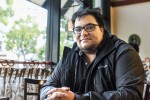Years ago, Marco Carvalho biked into an abruptly opened car door. Last month, he almost hit a bicyclist on Wilshire Boulevard late at night, and at the end of this year, he will debut a documentary about problems bicyclists face.
Carvalho, a UCLA alumnus and independent film director, is creating a documentary called “Bike to the Future” to highlight the routine obstacles bicyclists encounter.
Carvalho said he biked frequently in Brazil, his home country. Several years ago, he participated in Audax, a 200-mile bike ride that took him over 18 hours to complete. Carvalho began to work on “Bike to the Future” when Tom Smuts, the film’s executive producer, suggested they make a documentary in August.
The documentary centers around the “Emmy Ride,” a trek Smuts organized to bring awareness to bicycling. Smuts and other movie industry executives biked from Santa Monica to the Emmy Awards in downtown Los Angeles in September.
Christopher Guetig, one of the film’s producers, said he thinks the idea of people biking to the Emmys in their fancy clothes is a unique way to draw attention to the biking community.
In August, the Los Angeles City Council approved the Mobility Plan 2035, which will add hundreds of bike and bus-only lanes to the city. The plan also proposes officials add a bike lane to Westwood Boulevard, but Councilman Paul Koretz and some Westwood residents are petitioning to add the lane to a different Westwood street.
Carvalho and his team plan to expand “Bike to the Future” into a study about bicycles and transportation in Los Angeles. They plan to talk to frequent bikers, occasional bike users and the president of the Petersen Automotive Museum, among others.
Carvalho said he recalls L.A. City Councilman Mike Bonin saying 50 percent of the cars in Los Angeles carry single riders who commute less than four miles. Carvalho said this statistic continues to motivate him to share the findings from his project.
He added his interest in the subject grew when he stumbled upon a question that highlighted the irony of the transportation problem for bikers.
“So the solution for transportation problems is something invented 200 years ago?” he said.
Carvalho said he thinks increasing bicycle use is beneficial for the environment, but would also help reduce the traffic that is a prominent characteristic of Los Angeles living.
“It is not only a green thing, it’s a good thing for everybody,” said Carvalho.
Jim Bledsoe, a frequent cyclist and volunteer at the nonprofit organization Bicycle Kitchen, added he hopes Carvalho’s project will encourage people to stop using automobiles and start using bicycles.
“You don’t see road rage with people on bicycles,” Bledsoe said. “People on bicycles are smiling, it’s a humanizing thing.”
Although biking was a part of his life for years, Carvalho said he still sees the necessity of cars, and thinks cars can work in tandem with cycling.
“I did everything by bike for two to three years of my life,” Carvalho said. “But at some point we do need a car. I don’t believe it’s one thing versus another one, I believe two things are good together.”
In addition to the documentary, Carvalho’s team is working on two Web series. The team will partner with Bicycle Kitchen to film 10 short episodes on how to fix various bike problems, and film another series with the Los Angeles County Bicycle Coalition to highlight bicycle safety tips.
Bledsoe said he thinks more bike lanes need to be created because safe and accessible lanes would encourage more cycling.
He added he thinks the bike software Strava can help implement efficient bike lanes. Strava tracks the most frequently taken routes in an area, and city planners can use the data to decide where to put in bike lanes.
Carvalho said his goal for “Bike to the Future” is to encourage people to support the biking community, regardless of whether they are bikers themselves. He said he hopes their support will decrease the frequency of bicycle-related deaths.
